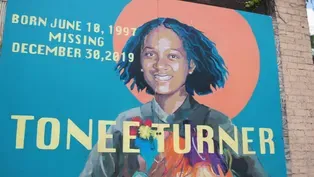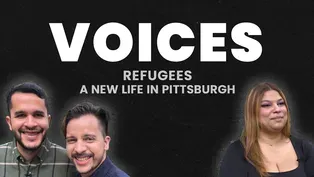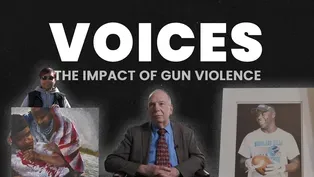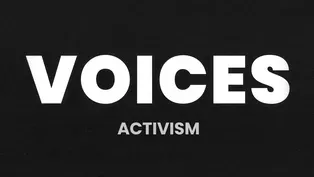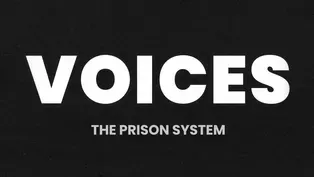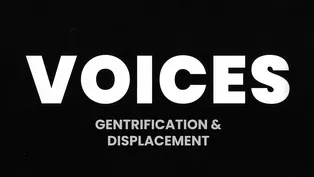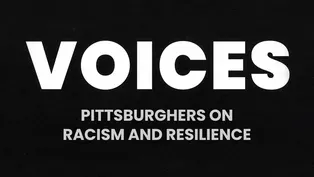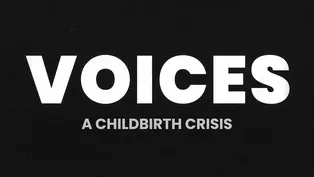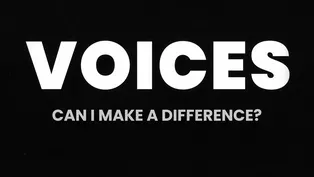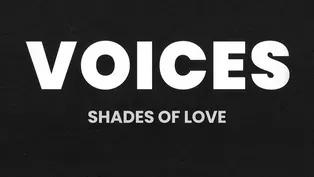WQED Digital Docs
VOICES: Why Words Matter
1/5/2022 | 5m 52sVideo has Closed Captions
This episode explores how derogatory terms enter the lexicon, and why words matter.
In 2020, people in Fox Chapel, Pennsylvania fought to remove the word "squaw" from signs and landmarks in their borough, after a Native American woman pointed out the offensive nature of the word. This episode explores how derogatory terms enter the lexicon, and why words matter.
WQED Digital Docs
VOICES: Why Words Matter
1/5/2022 | 5m 52sVideo has Closed Captions
In 2020, people in Fox Chapel, Pennsylvania fought to remove the word "squaw" from signs and landmarks in their borough, after a Native American woman pointed out the offensive nature of the word. This episode explores how derogatory terms enter the lexicon, and why words matter.
How to Watch WQED Digital Docs
WQED Digital Docs is available to stream on pbs.org and the free PBS App, available on iPhone, Apple TV, Android TV, Android smartphones, Amazon Fire TV, Amazon Fire Tablet, Roku, Samsung Smart TV, and Vizio.
Providing Support for PBS.org
Learn Moreabout PBS online sponsorshipMore from This Collection
Video has Closed Captions
When a person of color goes missing, are they given the same consideration as other races? (11m 24s)
VOICES: Refugees: A New Life in Pittsburgh
Video has Closed Captions
Every year, hundreds of refugees arrive in Western Pennsylvania, hoping to start new. (7m 18s)
VOICES: The Impace of Gun Violence
Video has Closed Captions
While no two stories are the same, the impact of gun violence affects nearly everyone. (9m 38s)
Video has Closed Captions
Meet people who were moved by societal concerns to take action for the first time. (10m 48s)
Video has Closed Captions
Hear from formerly incarcerated local citizens on their experiences and hopes for change. (11m 8s)
VOICES: The Generational Wealth Gap
Video has Closed Captions
An absence of generational wealth among minority families often leads to obstacles. (7m 32s)
VOICES: Gentrification & Displacement
Video has Closed Captions
We look at gentrification and its impact on Pittsburgh's marginalized communities. (9m 59s)
VOICES: Pittsburghers on Racism and Resilience
Video has Closed Captions
Pittsburghers of different backgrounds share their encounters with discrimination. (10m 45s)
Video has Closed Captions
Decades of inequity in the healthcare system have led to a crisis in Black maternal health (10m 9s)
VOICES: Can I Make a Difference?
Video has Closed Captions
Pittsburgh area youth talk about today’s social climate, racism, inequity, and more. (6m 31s)
Video has Closed Captions
Two couples of reflect on their personal experiences with interracial relationships. (10m 26s)
Providing Support for PBS.org
Learn Moreabout PBS online sponsorship(light tense music) - It is a word that I prefer not to say, but the derogatory and racist and sexual connotations of such a slur is something that almost all, if not all, indigenous women know.
(light tense music) My name is Michele Leonard and I am an enrolled citizen of the Shinnecock Nation of Southampton, Long Island, New York, (light tense music) There is a C-word that refers to, in a very, very denigrating and sexual derogatory way of referring to a woman's female parts, and so it's akin to that.
(light tense music) (truck passing) (stream flowing) (light tense music) I would rent a PO box at the post office and had all of my mail sent to the PO box just to avoid using the word and to avoid letting people that I care deeply about know that unfortunately, I was living on that road.
- People attach a lot to the words they use and they are really powerful, so they can be really offensive and they can make people feel bad.
(light pensive music) So these words come in with people not realizing that they're a slur sometimes, but sometimes they do realize that they're a slur but then they get used so much that nobody even thinks about them anymore.
(light pensive music) That comes from gypsy and of course, that is a term that relies on a stereotype of a person who is going to cheat you out of something.
That was always a slur and it remains one.
- Look at that little flower right there.
We're standing in one of Fox Chapel's beautiful parks that used to be called Old Squaw Trail.
There's any empty space.
Fox Chapels' borough has voted to remove all uses of the slur from our community, including this one.
I was really kind of disturbed to hear that it was such an offensive word.
Once we understood that there was consensus amongst a historically violently-oppressed minority group, the majority of this community was happy to make that shift.
I have four children.
Two of them are daughters.
If there was a word that was that offensive to girls and my daughters had to drive past that every day, I would not be cool with that.
- The names of them have been changed.
There are lots of ways to honor an area and to respect an area with the use of words without having to hurt others in that process by recognizing the fauna and flora and the animals and nature.
(light pensive music) And we can go forward knowing that Native women won't be at the expense and be continually hurt by seeing that word.
- It happens all the time and we learn to use new words for old things or organize the world in a different way, and it's perfectly common for that to happen.
There's no reason why we can't do it.
- You have two choices.
You can stop and show respect, or you continue, and then we know where we stand.
Words matter because they can inspire, they can educate, but they can also hurt.
And once they are spoken, you cannot take them back.
In my whole life, I have never referred to myself as a Native S, or as an S. I'm a woman who happens to come from a beautiful, rich culture, indigenous to these United States of America.
(light upbeat music) (music fades)
